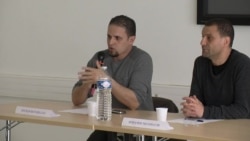Radical Islam has become a top security threat in many countries. But why are young people attracted to it? That is a big question facing France, where authorities estimate nearly 1,500 people have left to join jihadist groups in the Middle East. A former Guantanamo Bay detainee may not have all the answers, but is on a campaign to change young minds.
If Mourad Benchellali’s life had gone as planned, he would not be touring the country, warning about the dangers of militant Islam. Fourteen years ago, he had a job and a fiancee. Then he went to Afghanistan at the age of 19, and his life turned upside down.
Benchellali says his older brother tricked him into going to Afghanistan for a vacation. Instead, he ended up at an al-Qaida training camp. When he finally escaped, he was arrested and sent to the Guantanamo Bay detention camp. That was in 2001, just after the terrorist attacks in the United States.
Today, 33-year-old Benchellali is back home in Venissieux, a gritty suburb of Lyon, in central France. He is telling his story so young people will think twice before joining jihads in the Middle East.
He says he does not have all the answers about why young people are leaving, because every story is personal. But he believes he can help find the keys.
Hundreds of French have headed to Iraq and Syria in recent months. Their departure, says Middle East and North African specialist Mansouria Mokhefi, is leaving authorities scrambling for answers.
“The most important questions today are why are these young people leaving France? What is attracting, what is drawing them there? How is this propaganda so effective and how is it working? And, above all, what has failed in France to have the young people leaving for jihad?" asks Mokhefi.
These questions are being asked across the country, but especially in places like Venissieux, where youth unemployment is high and drug dealers lurk in the shadows. It is here where Benchellali grew up in a family of Algerian immigrants, and where his older brother turned to radical Islam.
Benchellali says he paid the price for that brother’s deceit. He spent 30 months in Guantanamo before being transferred to French custody. When he finally left prison in 2006, he wrote a book about his experience. He called it A Journey to Hell.
At first Benchellali’s book made little impact in France. But that has changed with rising fears of militant Islam. In recent months, he has testified before the French Senate and met with senior officials, and he delivers speeches in Muslim communities in the suburbs of Paris.
Chahrazed Bourih, who attended one such talk by Benchellali, believes he can help young people who are tilting toward extremism. The mother of five says she was once on that road herself.
But analyst Mokhefi says while Benchellali can make a difference, he is no match for the propaganda machine of groups like Islamic State.
“Yes, he can have an important role communicating, explaining, but dissuading? I am not so sure,” says Mokhefi.
But Benchellali believes he can be a model for others. He has rebuilt his shattered life. His hell is over, he says, but he is afraid that for others it is only just beginning.





